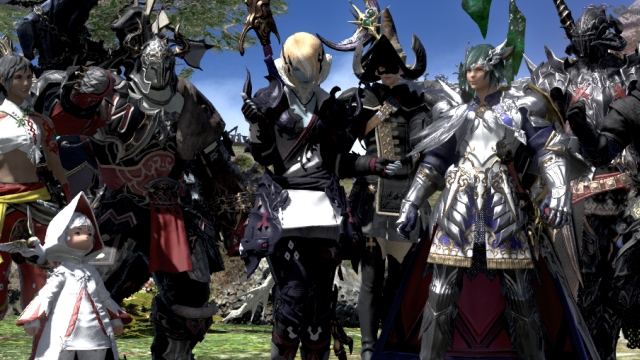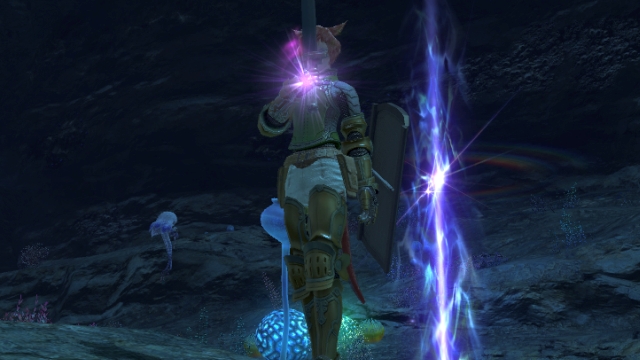Having new members join your guild is always exciting, no matter how informal your guild might be. What’s less exciting is when that new member leaves after two weeks because they don’t feel like the guild is a good fit for them.
It’s upsetting, sure, but it’s also understandable. After all, they never did anything with the rest of the guild, never spoke up during conversations, never participated, never started events. And it’s only when you think about it a little bit that you realize that the reason for all of those things might have to do with your guild not actually giving new members the tools needed to get involved, start events, be heard, and become a part of the guild.
Last week, I talked a lot about how to make sure that you were getting the right applicants for your guild. This week, it seems only fitting to look at the flip side. Once you have the right people applying and joining, how do you get them to have a good time, get invested, and stick around?

Come along
The first thing to do is to go out of your way to include the new member. Not simply by offering the member a spot if they speak up, but by asking for that member specifically. “Hey, Tyler, we’re going to do a dungeon run; would you like to come along?”
The point is that you want to involve the new member, but you’re doing so in a way that’s welcoming but non-restrictive. Simply going on a run doesn’t work well in this scenario, nor does generally asking if anyone wants to come along. Tyler may not yet feel confident enough in his ability to handle a dungeon run with the group or feel like the group really wants him along on a dungeon run. Making the question explicit for him and then asking for other volunteers makes it clear that he’s thought of and welcomed.
However, it’s also open-ended. Tyler can say no, either because he can’t or because he seriously doesn’t want to right at that moment. It’s inclusive, not exclusive, and it’s unambiguously targeted at getting Tyler doing something with the rest of the guild without putting undue pressure on Tyler.
Far too many guilds adopt a “sink or swim” mentality, where someone like Tyler can speak up if he wants to be heard. The problem is that I’ve found someone like Tyler will specifically not speak up; he’s aware that he’s treading in ground owned by other people and doesn’t want to make waves or be disruptive. By putting the burden of making Tyler known on Tyler, you are subtly sending the message that you don’t care if he’s here or not. That’s hardly conducive to forming bonds.
The same thing goes for conversations. If you notice that Tyler isn’t speaking up with other members, ask him about it. When he does so, encourage him. Don’t put pressure on him, but coax him gently to come out of his shell and get involved with the rest of the group. For some people, it’s enough to just know that their presence or lack thereof is noticed, rather than just tossed in the background. Let Tyler feel like part of the group, even if he’s a new part, rather than just someone filling out a number on the roster.

Helping with setup
For most groups, there’s a bit of a probationary period with any new members, time for the member to learn what the guild is like, and vice versa. Assuming all of that goes well, the new member is now a full member of the guild. And that’s the perfect time to sit down with your member, ask what they need, and start guiding them into making it happen.
It’s a good thing for every member of a guild to have a hand in running events, but in the case of new members it’s particularly relevant, because it’s part of the process wherein a new member finds their events. It’s a step along the road to making your new member more than just a new face, but a part of the guild as vital as any other.
So let’s say you’re sitting down with your new member, Cheryl, and she mentions that she very much wants to be running more old content for vanity items and the like. That’s perfectly valid, and you can help her through the process of marking an event to do just that within the guild calendar and setting up a roster. Guide her gently without running it yourself, and encourage the rest of the group to take part while offering feedback.
“But what if she doesn’t want to run something we don’t already run?” Well, it happens more often than you might think. After all, there’s a reason we seek out specific guilds, usually because they’re already providing the sort of events that we want to take part in. That does make it a bit more difficult to get the new member to run something, but not insurmountable — it’s just a matter of handing off leadership duties for the event to your new member for a bit. Let the new girl form the weekly dungeon run for a week or two, let her be the authority, and let her see how she likes doing it.
The key is making events feel manageable rather than something difficult but important; even if they person in question doesn’t run them regularly after the first few events, the idea is planted in the player’s head that they can run one.

Resource adjustment
In games like Heroes of the Storm, new members to your guild don’t really need to bring much of anything and also don’t take much of anything. Resources aren’t a considered thing. But in games like Star Wars: The Old Republic, it’s a big deal if your new member needs a whole bunch of rare resources that the guild has…in slightly disproportionate shape with the new member’s contribution. Or vice versa.
I’ve seen lots of guilds have more relaxed item rules for new members, but frankly, this is a bad idea on several levels. For one thing, it’s pretty basic bribery; for another, it creates a very unusual curve of membership wherein it’s better to be new than to be established. Everyone gets a bit resentful about that sort of thing.
A better idea is to assess what the new member needs and what said member can provide to make things even. Sure, those rare materials for crafting might be easier for the long-time members to gather and might not be a big deal for them…but the new member can provide more mundane but still important items. Or perhaps the new member tosses extra money into the guild bank in exchange for having a whole lot of additional materials. Resources can be offered to a new member without simply bribing them.
The trick is to establish an environment that’s welcoming and novel without making the new member feel coddled or ignored. Which is a complex procedure, of course, but a bit of care makes it far easier overall. When done right, you get to be sure that your new members are succeeding within the space allowed by your guild, and neither expecting nor wanting to just be carried or ignored until they leave.







Published: May 18, 2016 05:12 am